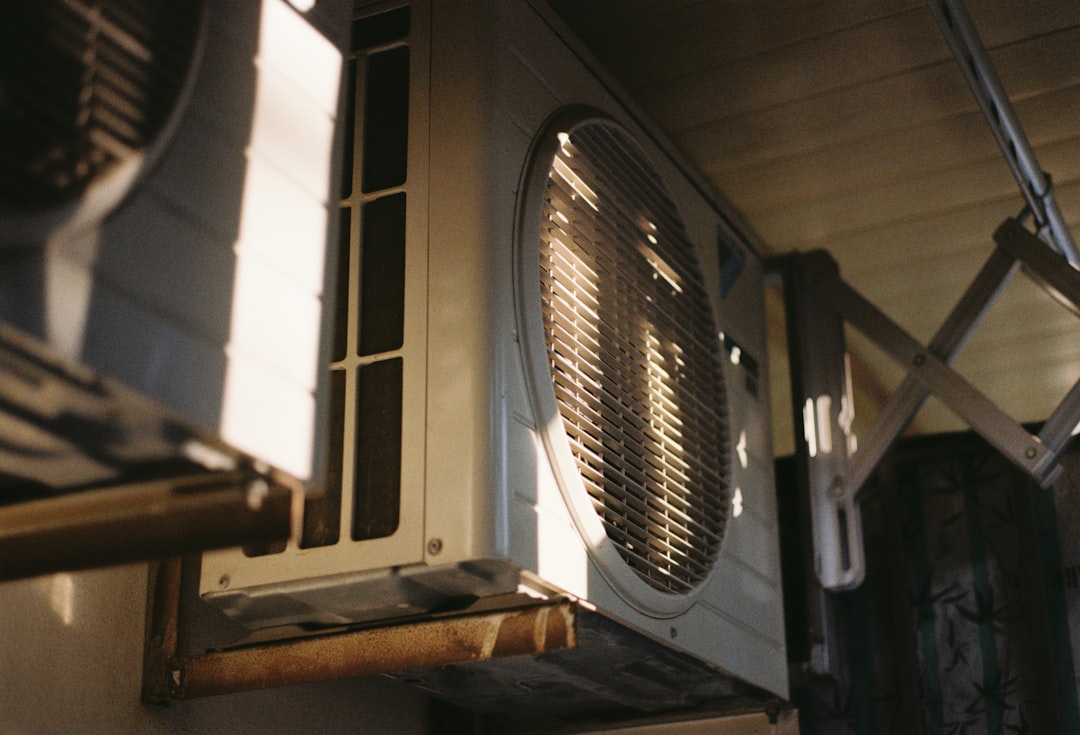
When Your AC Runs Silent: Understanding a Non-Working Fan
An AC fan not working is one of the most common problems homeowners face during Southern California's sweltering summers. When you turn on your air conditioner and feel no cool air, or when your outdoor unit is silent, the culprit is often a failed fan.
Quick Answer: Why Your AC Fan Isn't Working
Your AC fan may have stopped for one of these reasons:
- Thermostat is set incorrectly - Check that it's on "Cool" mode and set below room temperature
- Circuit breaker has tripped - Reset the breaker at your electrical panel
- Air filter is completely clogged - Replace it immediately to restore airflow
- Capacitor has failed - You'll often hear humming but see no fan movement
- Fan motor has burnt out - Listen for grinding noises or complete silence
- Contactor switch is defective - The fan won't receive power to start
Your air conditioning system relies on two fans. The indoor blower fan circulates air over the cold evaporator coils and through your ductwork. The outdoor condenser fan pulls air across the condenser coils to expel heat. When either fan stops, the cooling process breaks down. If the indoor fan fails, you'll notice little to no airflow from your vents. If the outdoor fan stops, you might hear the compressor humming but see no spinning blades. Both scenarios require prompt attention to prevent further damage.
I'm Daniel Rodriguez, and in my years with plumbing and HVAC systems across Southern California, I've diagnosed countless AC fan not working issues. Understanding what's happening with your system is the first step toward getting your cool air back.
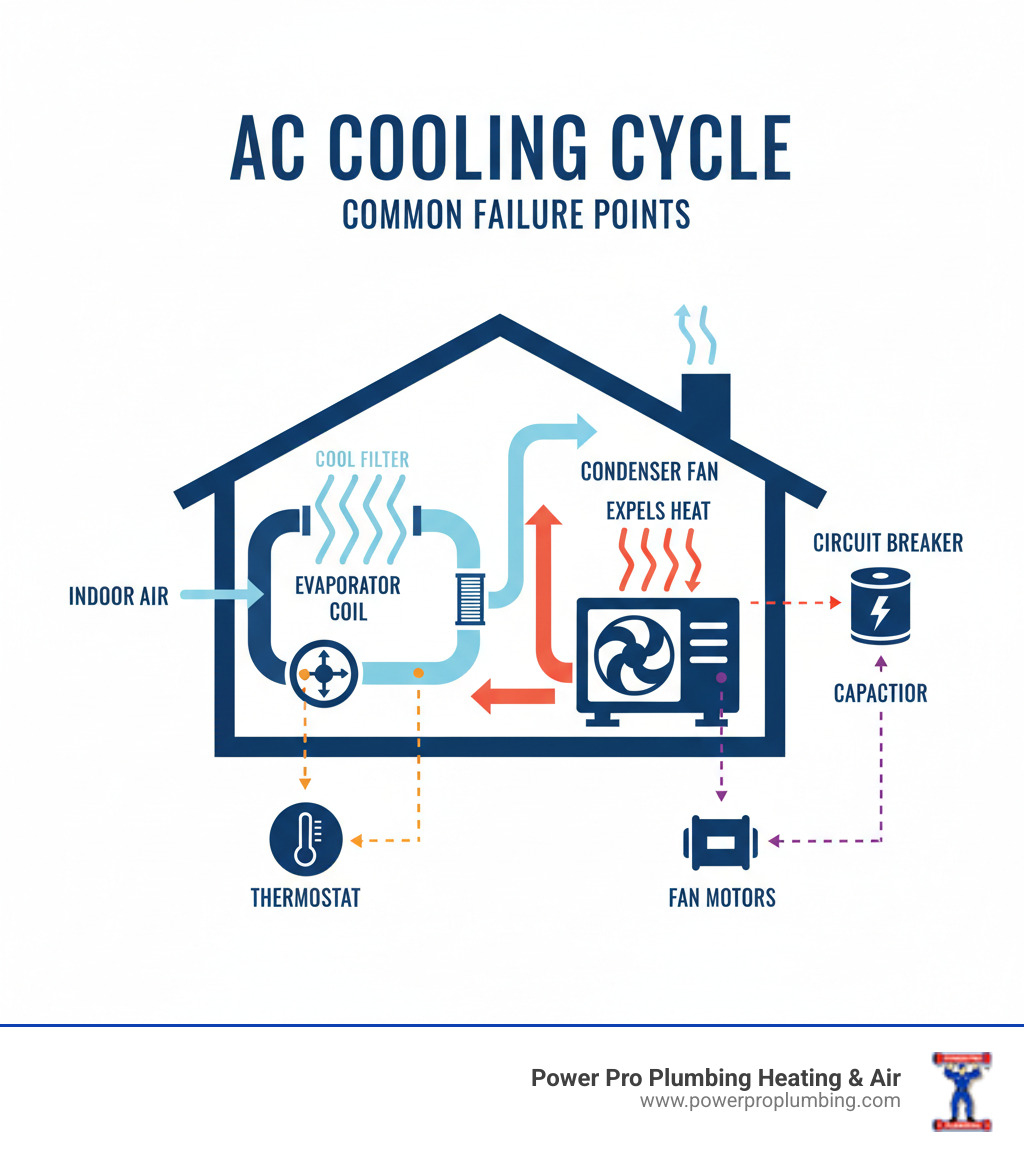
First Steps: Simple DIY Troubleshooting for a Non-Working AC Fan
When your AC fan not working interrupts your day, don't panic. Several simple checks can solve the problem without needing a technician. Many "broken" ACs are just a thermostat mishap or a tripped breaker. Let's walk through these quick fixes.
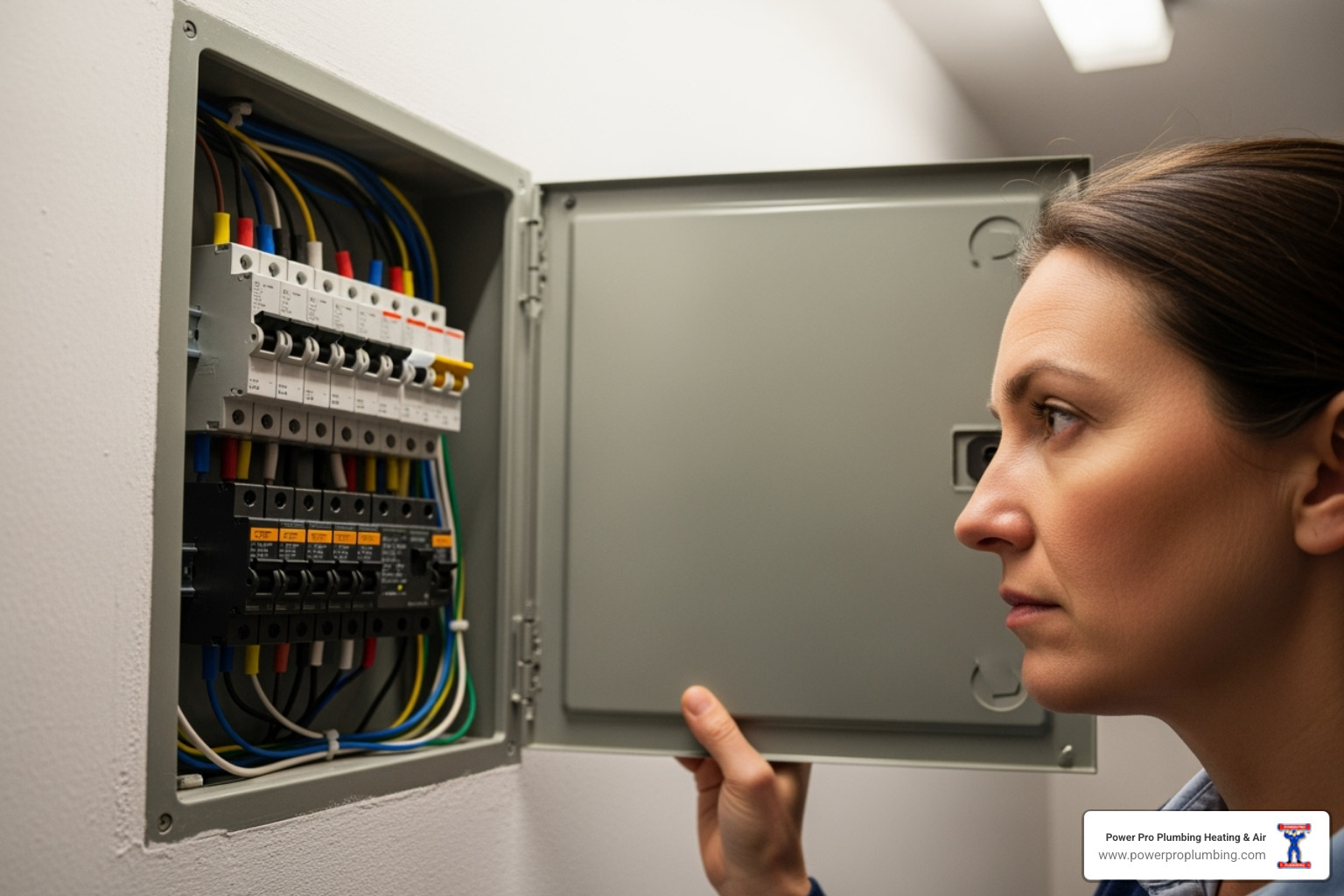
Thermostat Settings
It sounds obvious, but always check your thermostat first. Ensure it's set to "Cool" mode, not "Heat" or "Fan Only." Next, check that the temperature setting is lower than your current room temperature. If your home is already cooler than the set temperature, the system won't turn on. The Department of Energy recommends 78°F for energy efficiency, but you may need to set it lower.
Finally, check the fan setting. "Auto" runs the fan only during cooling cycles, while "On" runs it continuously. If it's set to "On" and you feel no air, you have a problem that needs more investigation.
Check Your Circuit Breaker
Air conditioners use a lot of power and can trip circuit breakers. Head to your circuit breaker panel and look for the breaker labeled "AC" or "HVAC." A tripped breaker will be in the middle position or flipped to "off."
To reset a tripped breaker, first turn off your AC at the thermostat. Then, push the breaker firmly to the "off" position before flipping it back to "on." Wait 30 minutes before turning the AC back on. If the breaker trips again, do not keep resetting it. This indicates a serious electrical issue that needs a professional. Our guide on Why Your AC Circuit Breaker Keeps Tripping explains this problem in more detail.
Inspect and Replace Your Air Filter
A clogged air filter is a common and preventable cause of AC problems. Your air filter is usually in the return air duct near your indoor air handler. Pull it out and hold it to a light. If you can't see light through it, it's time for a replacement.
A clogged filter restricts airflow, causing the evaporator coils to get too cold and freeze over. This ice buildup blocks air, making it seem like the fan is broken. The system may even shut down to prevent damage.
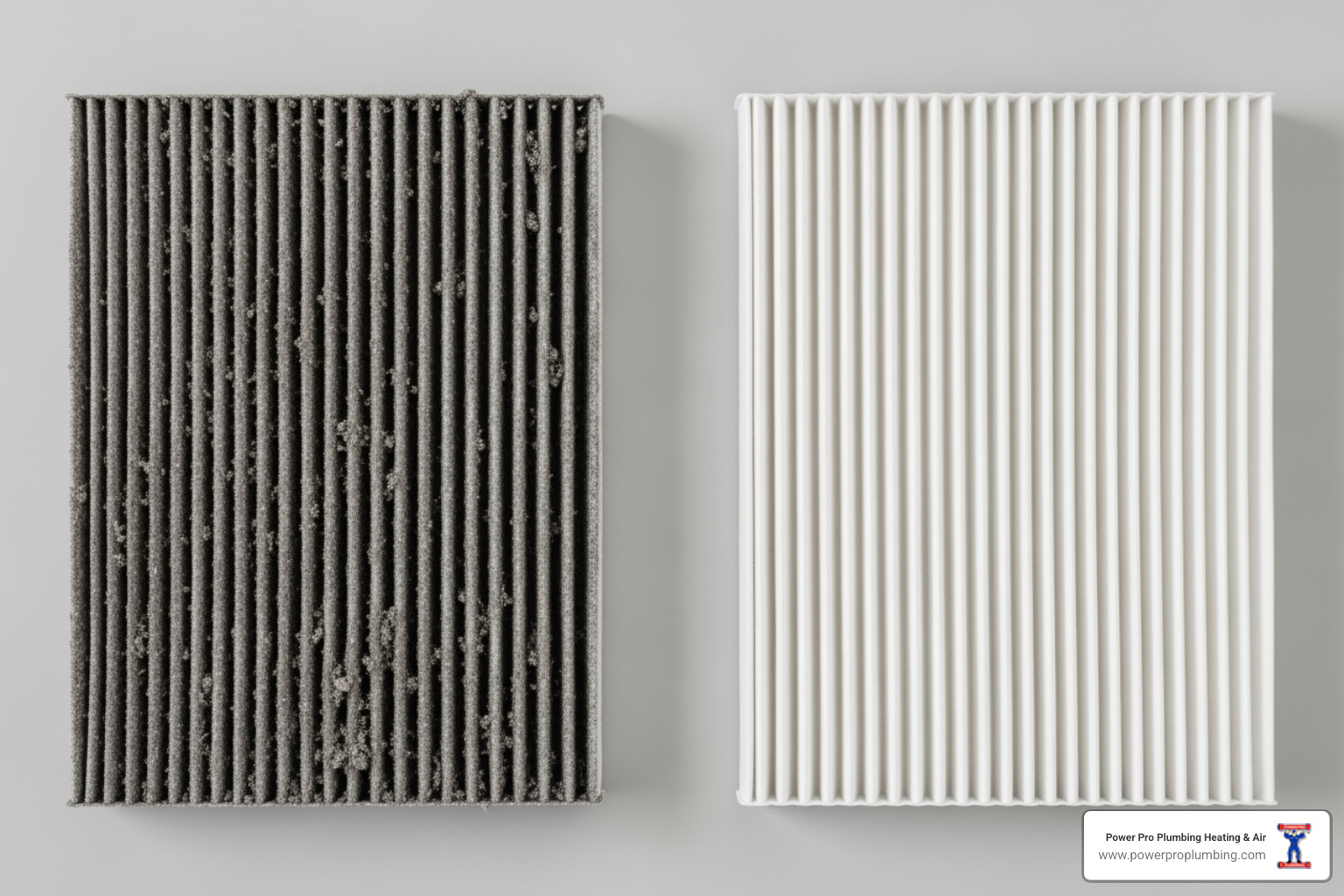
Replace your air filter every 1-3 months to maintain your system's efficiency and lifespan. It's one of the easiest and most important maintenance tasks.
How to Tell if the Indoor or Outdoor Fan Is the Problem
Your AC has two fans, and identifying the culprit helps diagnose the issue. The indoor blower fan pushes cooled air through your vents. If it fails, you'll notice little to no airflow, even if the outdoor unit is running. The outdoor condenser fan releases heat from your home. If it fails, you'll often hear the compressor humming but see the fan blades aren't spinning.
Use this table to identify the problem:
| Symptom | Likely Problem |
|---|---|
| No air from indoor vents | Indoor Fan |
| Weak airflow from indoor vents | Indoor Fan |
| Outdoor unit humming, but fan not spinning | Outdoor Fan |
| Outdoor unit completely silent | Power Issue / Outdoor Fan |
| Air conditioner not cooling effectively | Both / Outdoor Fan |
Once you know which fan is the issue, you can better understand the potential mechanical and electrical causes.
Why Is My AC Fan Not Working? Deeper Mechanical & Electrical Causes
If basic troubleshooting doesn't fix your AC fan not working, the problem is likely a more complex mechanical or electrical issue. These problems usually require a trained professional, but understanding the potential causes helps you know what to expect.
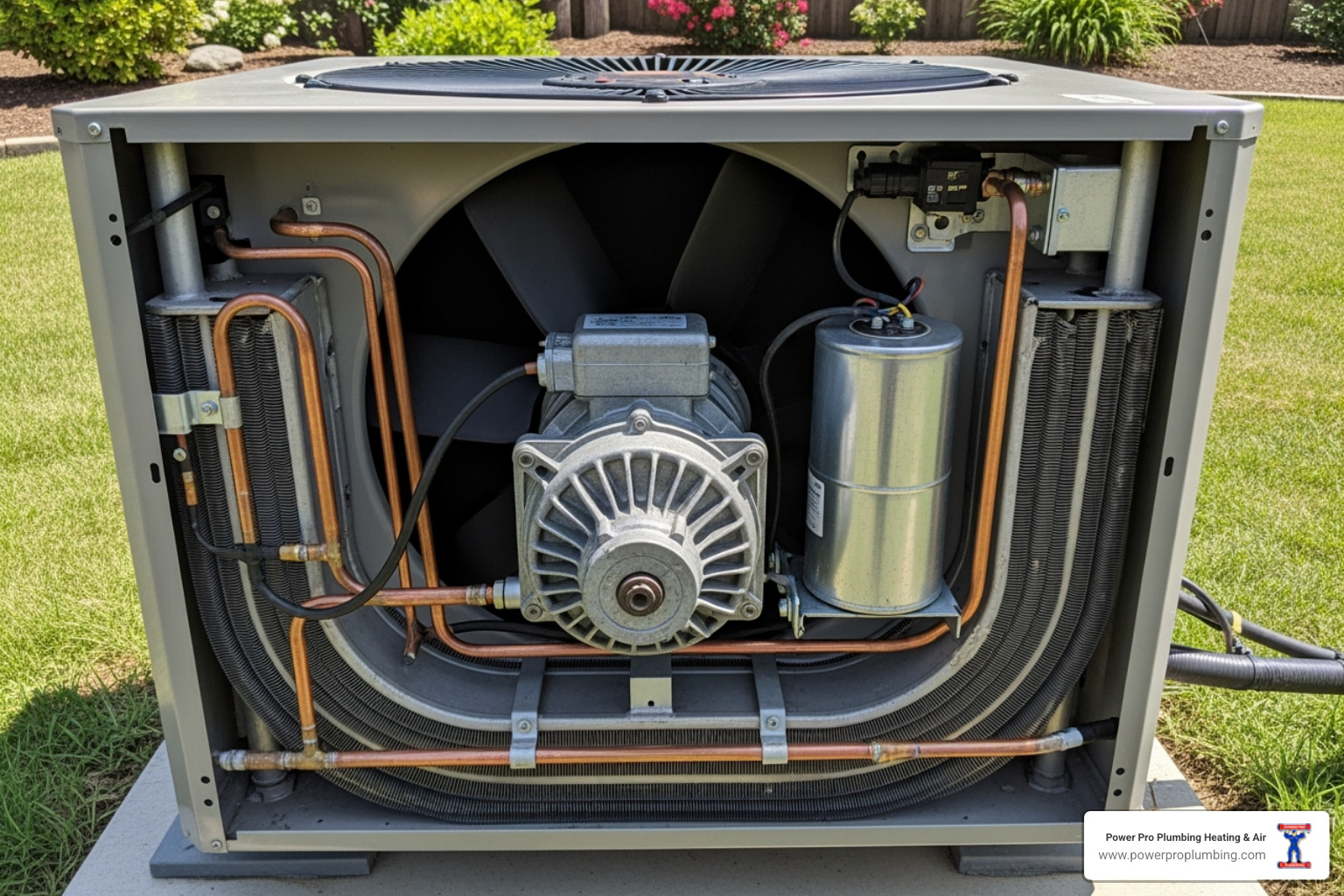
AC components wear down over time. The fan motor can fail after thousands of hours, often preceded by grinding or squealing noises. Sometimes, debris like sticks or leaves can get into the outdoor unit, jamming the motor or damaging the fan blades. On older systems, a snapped fan belt could be the issue, though most modern units are direct-drive.
Electrical Issues That Can Cause an AC Fan to Stop Spinning
Electrical components handle high voltage and are dangerous to service without proper training. Even with the power off, some parts can hold a dangerous charge.
The capacitor is a common failure point. It provides the electrical jolt needed to start and run the fan motor. When a capacitor fails, you'll often hear a humming noise from the unit—the motor has power but can't get started. You might also see the fan struggle to start or notice a bulging or leaking top on the capacitor itself.
A burnt-out fan motor may produce grinding sounds as its bearings fail, or it might just stop working silently. This often happens when the motor is overworked due to a dirty filter or frozen coils.
The contactor switch acts as a relay, sending power to the fan motor when the thermostat calls for cooling. A defective contactor might click, but it will fail to send power, so the fan never starts.
Power surges can also instantly damage any of these components. Learn more in our guide on How Can a Power Surge Affect My Air Conditioner.
Airflow Problems: Frozen Coils and Blockages
Sometimes, the fan isn't the root cause. A problem elsewhere can trigger a safety shutdown that stops the fan. A severely clogged air filter restricts airflow, causing the evaporator coils to freeze. This ice buildup blocks air from passing through, making it seem like the fan has failed. The system often shuts down to prevent compressor damage. If you suspect frozen coils, turn off your AC and let it thaw for several hours. Our article on an AC System Freezing Up provides more detail.
Additionally, a clogged condensate drain line can cause water to back up in the drain pan. A safety shut-off switch detects this and cuts power to the entire system, including the fan, to prevent water damage. If your system suddenly stops and you see water near the indoor unit, a blocked drain line is the likely culprit.
Risks and Red Flags: When to Call for Professional AC Repair
When your AC fan not working issue persists after basic checks, it's time to call a professional. Attempting complex repairs can turn a manageable problem into a catastrophic system failure.
System Overheating and Compressor Damage
The compressor is the heart of your AC system. It circulates refrigerant to move heat from inside your home to the outside. Without a working outdoor fan, that heat has nowhere to go. The compressor becomes trapped in an overheated environment, straining until its internal components fail. The result is a burnt-out compressor—often the single most expensive component to replace in an AC system.
To prevent this, do not continue running your air conditioner if you know the fan isn't working. Turn the system off immediately. Running it wastes electricity and risks a domino effect of damage to other components, turning a simple repair into a potential system replacement. Our article on the Top Causes of AC Unit Failure explains how these failures interconnect.
Reduced Efficiency and Higher Energy Bills
A malfunctioning fan also harms your system's efficiency. The AC runs longer to try and cool your home, driving up your energy bills without providing comfort. This reduced airflow also allows humidity to build up, creating a sticky, uncomfortable environment. For more warning signs, see our guide on 10 Signs Your AC Needs Repair Work.
DIY Limitations and Electrical Hazards
While checking thermostats and changing filters is safe, electrical components like capacitors, contactors, and fan motors are not DIY-friendly. Capacitors can store a lethal electrical charge even after the power is off. If you hear humming, see damaged parts, or are unsure of the problem, call a certified HVAC technician. The risk to your safety and your system is not worth the potential savings.
Signs Your AC Fan Needs Replacement
Sometimes, a fan motor or its blades are beyond repair. Here are signs you need a replacement:
- The fan won't start at all, even though the system has power.
- The fan blades spin slowly or wobble as they turn.
- Loud rattling, grinding, or squealing noises come from the unit.
- The fan works intermittently, stopping and starting without a clear pattern.
These symptoms often point to a failing motor that needs professional attention. For more urgent warning signs, check out our guide on Urgent Signs for AC Unit Repairs.
Frequently Asked Questions About AC Fan Failures
Can a dirty air filter really stop the AC fan?
Yes. A severely clogged filter restricts airflow, which can cause the evaporator coils to freeze over. This ice buildup physically blocks air from moving, or it can trigger a safety switch that shuts down the entire system, including the fan, to prevent damage.
What does a humming sound mean if the fan won't start?
A humming sound from the AC unit when the fan isn't spinning is a classic symptom of a failed capacitor. The motor is receiving power (which creates the hum) but lacks the necessary electrical "kick" from the capacitor to start rotating. This repair requires a professional, as capacitors can hold a dangerous electrical charge.
Is it safe to run my AC if the fan isn't working?
No, it is absolutely not safe. Turn your system off immediately if you notice the AC fan not working. Continuing to run it will cause the system to overheat, which can quickly destroy the compressor—the most expensive component in your AC. It's better to be uncomfortable for a few hours than to risk thousands of dollars in preventable damage.
Get Your Cool Air Back with Expert Help
We know how frustrating it is when your AC fan not working turns your home into a hotbox. If you've checked the thermostat, breaker, and air filter without success, it's time to bring in the professionals.
While simple checks are great first steps, issues like faulty capacitors, burnt-out motors, or frozen coils require specialized tools and knowledge. Attempting complex electrical repairs is dangerous; capacitors can hold a lethal charge even when the unit is off. One wrong move can cause serious injury or lead to a full system replacement.
At Power Pro Plumbing Heating & Air, our certified HVAC technicians have the experience to diagnose and repair any AC fan not working scenario. We can get your indoor blower or outdoor condenser fan running again quickly and safely.
We proudly serve the greater Los Angeles area, including Beverly Hills, Marina Del Rey, and Yorba Linda. With over 28,573 online reviews and our status as a Daikin Comfort Pro, we stand by our work with strong warranties on parts and labor. Our Power Pro Club membership also offers maintenance benefits to help you avoid breakdowns before they happen.
Don't suffer through the heat. When DIY troubleshooting isn't enough, trust the team that Southern California homeowners rely on to restore their comfort.
Schedule your professional air conditioning service in Beverly Hills today!

